1. Understanding Human Rights
Human Rights in a lens particularly means having fundamental entitlements that every individual possesses by virtue of being Human1. These rights does not bar aspects of Nationality, ethnicity, gender, religion, caste or any other status. These rights are often enshrined in international and national laws to ensure that individuals are treated with dignity, equality, and respect.
1.1 Following are the categories of Human Rights2:
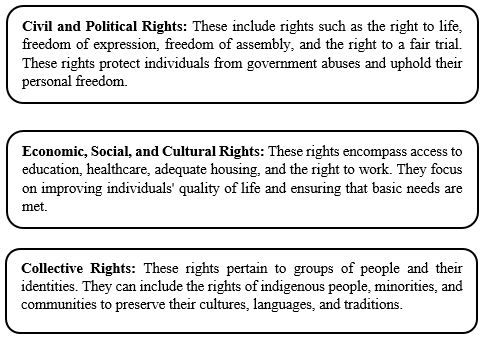
1.2. Why are Human Rights important?
- Dignity and Respect: Human rights recognize
the inherent worth of every individual, emphasizing that everyone
deserves to be treated with dignity and respect, regardless of
their circumstances.
- Freedom and Empowerment: Human rights grant
individuals the freedom to express their opinions, make choices,
and participate in shaping their societies. This empowerment
contributes to personal growth and societal progress.
- Equality and Non-Discrimination: Human rights
promote equality by ensuring that all individuals are protected
from discrimination based on factors like race, gender, religion,
or disability.
- Rule of Law: Human rights are closely tied to
the rule of law, which means that laws are applied equally to
everyone and provide a framework for resolving disputes and
addressing grievances.
- Conflict Prevention: Societies that respect human rights tend to experience less conflict and violence, as grievances can be addressed through peaceful means rather than resorting to violence.
And for countless other reasons, Human Rights form the foundation of a just and equitable society. They protect individual freedoms, promote equality, and contribute to all the overall well-being and progress of both individuals and communities.
2. How Labour Rights came into the picture3:
Labour rights are the bedrock of modern societies, ensuring that workers are treated with dignity and fairness in the workplace. These rights encompass a wide range of entitlements and protections, from fair wages and safe working conditions to the right to join unions and collectively bargain. In this article, we delve into the significance of labour rights and their profound impact on individuals, communities, and societies as a whole.
2.1 What are the various rights that are entitled to a worker?
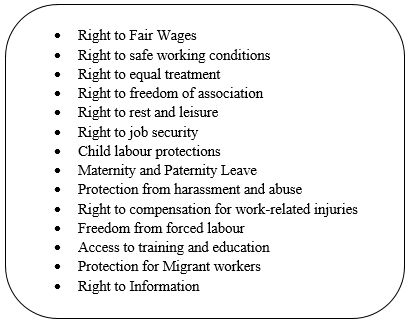
2.2 Globalization and Labour Rights Concerns4:
In an era of unprecedented globalization, the landscape of labor rights has evolved significantly. The interconnectivity of economies, the rise of multinational corporations, and the rapid flow of information have reshaped the way labor rights are understood and enforced. This article explores the complex intersection of labor rights and globalization, highlighting both the challenges and opportunities it presents.
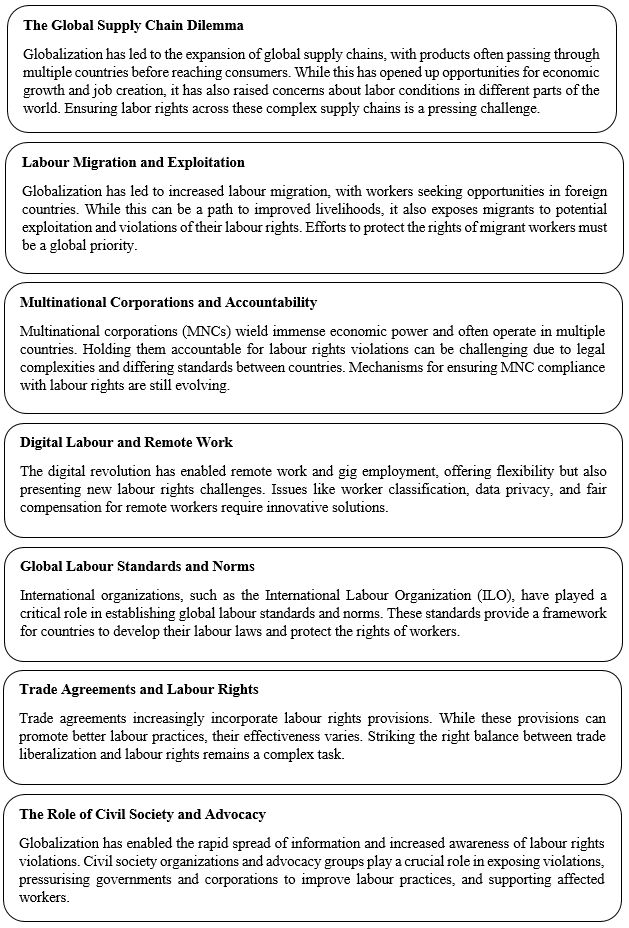
2.3 The Labour Codes and Labour Rights5:
Four Labour Codes were introduced to consolidate and simplify various labour laws and regulations in the country. These labour codes aimed to bring about significant changes in labour rights, employment practices, and industrial relations.
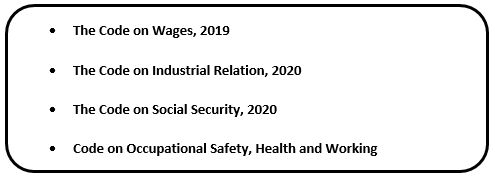
The introduction of labour codes in India marked a significant effort to enact reforms that address a range of issues related to labour rights and underscored the importance of Business and Human Rights (BHR). These labour codes were designed with a dual purpose: to establish stability in the labour market and enhance the overall landscape of labour rights. While it is evident that many reforms remain pending and await implementation, it is important to note that the Labour Codes have also yielded a host of positive outcomes. One of the primary objectives of these labour codes was to streamline and simplify the complex web of labour laws that had accumulated over the years.
- The code on wages establishes a national 'floor wage,' which sets a consistent minimum wage across India for the first time. Currently, different levels of minimum wages are determined by Central and State governments, taking into account the skills and experience of workers. In the future, State Governments are not permitted to establish a minimum wage lower than this base wage. If a state government has already set a higher minimum wage, they cannot reduce it to align with the floor wage.
- The social security code empowers the government to broaden the reach of social security benefits to specific groups of workers that were previously not officially recognized. These groups include unorganized workers, gig workers, and platform workers. The terms 'gig workers' (individuals working outside traditional employer-employee arrangements) and 'platform workers' (individuals hired through online platforms or marketplaces) represent novel concepts and encompass individuals engaged in employment that had not been encompassed by conventional social security measures. If effectively implemented, this expansion will encompass a substantial number of workers who were previously devoid of protection and will include them within the framework of basic social security coverage.
- Enhanced healthcare, safety, and working conditions are a key focus of the Occupational Safety, Health, and Working Conditions Code. This code introduces several new welfare mandates and makes significant revisions to existing health and safety (H&S) provisions. Instead of applying exclusively to a limited category of establishments like "factories" or "mines," uniform H&S regulations and working conditions now extend to all commercial establishments. This expansion significantly broadens the scope of these essential protections. Notably, the code acknowledges the rights of transgender individuals for the first time, mandating that employers allocate separate bathing, restroom, and locker room facilities for them. Employers are also obligated to provide free annual health check-ups, and they cannot impose charges on employees for H&S measures.
- To enhance the mitigation of risks encountered by contract workers, the industrial relations code establishes a structure for involving fixed-term workers, a concept that is absent in the current legislation. Firms can now employ individuals for a specified period under identical employment terms as permanent employees. These fixed-term workers are also eligible for prorated statutory benefits, even if they do not technically meet the statutory requirements for these benefits based on their length of service. Additionally, they are entitled to receive gratuity if they have worked under a contract for one year as stipulated in their contract.
3. The Human Rights in an International Perspective:
3.1 International Labour Organization (ILO) on Human Rights:
For individuals who are deeply concerned about human rights and fundamental labour rights, the year 1998 holds a unique significance. It serves as a pivotal moment for reflection, evoking both reasons for celebration and causes for concern. Even though there have been substantial advancements, there are still numerous instances where fundamental rights are violated. Armed conflicts persist, poverty remains prevalent, gender equality is far from achieved, and millions of children are still subjected to labour. Those who held the highest hopes half a century ago have been met with disappointment. Nevertheless, there have been remarkable achievements, and few would desire to revert to the past.
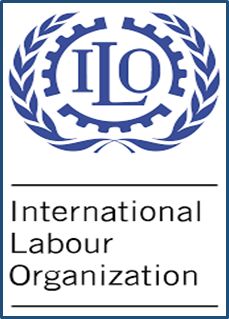
The explanation for these gains can be attributed in part to two significant international agreements established in 1948, precisely half a century prior. Firstly, the International Labour Conference adopted Convention No. 876, known as the "Freedom of Association and Protection of the Right to Organize Convention" in July. This convention formalized the protection of workers' and employers' rights to freely associate without requiring prior authorization, thus establishing these rights within the realm of international labour law. Additionally, later that same year, the United Nations General Assembly embraced the Universal Declaration of Human Rights, establishing a framework for the global pursuit of human rights.
3.2 UK Modern Slavery Act, 2015:
The UK Modern Slavery Act of 2015 stands out as the first national law to use the term 'modern slavery' and explicitly address 'slavery' rather than terms like 'human trafficking' or 'forced labour.'7 This approach has gained momentum globally, as countries like France, Australia, and the United States are adopting legislation specifically aimed at combating modern slavery. These efforts have undergone a significant shift in recent years, firmly establishing them as top priorities in both national and international policies. Nevertheless, before the late 1990s, such issues were not widely discussed in policy circles or academic discourse.
In 2020, the UK Government released its own modern slavery statement, identifying service staff, including cleaning services, as the sectors at the greatest risk of modern slavery. The majority of cleaners in the UK are female migrants who encounter various overlapping risk factors. Research conducted by various legal entities revealed that cleaners in the UK frequently confront issues related to low pay, the inability to take sick leave, hazardous working environments, and high levels of sexual harassment. Additionally, the limited presence of labour unions among cleaners leaves them without the resources or support to report workplace abuses, a situation that can be worsened by their precarious employment and immigration status.8
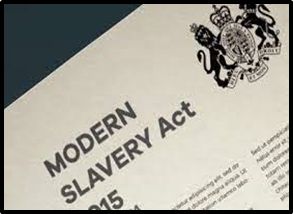
In May 2022, the UK government unveiled a Modern Slavery Bill with the goal of enhancing corporate responsibility in combatting modern slavery within their supply chains.9 The bill seeks to enforce six specific areas of disclosure within Modern Slavery Statements, establish a requirement to publicly disclose these statements on a government-operated registry, and impose penalties for failure to comply. This legislation is anticipated to revise or supplant the existing UK Modern Slavery Act.
3.3 European Union
The European Union (EU) adopted a sustainability rulebook: The Corporate Sustainability Due Diligence Directive (CSDDD)10 that encourages companies to institute due diligence processes that will help them to mitigate the negative consequences of their activities on both human rights and the environment, throughout their global supply chains. This endeavor seeks to encourage ethical and sustainable conduct among corporations while incorporating sustainability principles into their operational and governance practices. The Commission introduced the CSDDD in February 2022, and by December 2022, the European Council completed its overall strategy. The plan suggests a reduction in its coverage, focusing on EU firms with over 1,000 employees and EUR 300 million in global turnover, as well as non-EU companies with EUR 300 million in turnover generated within the EU.

The CSDDD is a component of the European Green Deal, which comprises a series of policy measures introduced by the European Commission. The primary objective of this initiative is to align the European Union's policies related to climate, energy, transportation, and taxation in a manner that enables a reduction of net greenhouse gas emissions by a minimum of 55% by 2030, as compared to 1990 levels, and to achieve climate neutrality by 2050.
3.4 Link between International Labour Standards and Human Rights:
Prior to the United Nations Charter reaffirming its commitment to "faith in fundamental human rights" and recognizing "the dignity and worth of the human person," international labor standards (ILS)11 had already been upholding the principles of human rights in the workplace. The 1948 Universal Declaration of Human Rights (UDHR) then officially outlined the human rights that would later serve as the cornerstone of decent work. After the Universal Declaration of Human Rights (UDHR), the International Law of Human Rights (ILS) continued to serve as a source of inspiration in shaping the development of human rights principles found within both the International Covenants on Civil and Political Rights and on Economic, Social, and Cultural Rights. ILS serve as a means of upholding various human rights within the workplace.
3.5 Human Rights Due Diligence in the European Union:
The emergence of human rights and environmental due diligence (HRDD or HREDD)12 mandates in various European nations, notably exemplified by the newly enacted German Supply Chain Act, has presented multinational corporations with unparalleled challenges when it comes to ensuring compliance. Moreover, within the European Union, these national HRDD requirements are poised to undergo substantial augmentation and expansion through an upcoming directive.
Within the European Union, the forthcoming Corporate Sustainability Due Diligence Directive (CS3D), introduced by the European Commission on February 23, 2022, is set to partially standardize national Human Rights Due Diligence (HRDD) requirements. CS3D will mandate that all EU Member States enact legislation that imposes HRDD responsibilities on businesses, with the ultimate goal of establishing an equitable framework across the EU. These requirements primarily centre on recognizing and mitigating the human rights and environmental consequences stemming from a company's activities, as well as those of its subsidiaries and supply chains.
3.6 The Destination:
In an increasingly interconnected world, it is crucial to delve deeper into the importance of comprehending and safeguarding human rights, particularly in the context of labour rights. This imperative extends beyond mere moral considerations; it forms the cornerstone of constructing a fair and impartial society. The globalization of our world has engendered a situation where the safeguarding of workers' rights goes beyond national boundaries. It necessitates collaborative efforts on an international scale, necessitating the development and enforcement of robust legal frameworks and sustained advocacy. These collective endeavors are vital to ensuring that every individual, irrespective of their circumstances or geographical location, has the opportunity to experience the fundamental rights and dignity they rightfully deserve within their workplace.
As businesses expand globally and supply chains traverse multiple nations, the well-being of workers is intricately linked to various regions and jurisdictions. Human rights violations, poor working conditions, and exploitative practices anywhere in the world have repercussions not only for the affected individuals but also for the global community. Issues such as child labour, forced labour, discriminatory practices, and unsafe working conditions can have far-reaching consequences, including negative impacts on trade, economic stability, and social harmony.
Footnotes
1. Impact of Globalization on Issues of Human Rights; https://www.legalserviceindia.com/legal/article-10067-impact-of-globalization-on-issues-of-humanrights; Date: 04.09.23
2. Human Rights Principles; https://www.unfpa.org/resources/human-rights-principles; Date: 04.09.23
3. The Evolution of Labour Law in India: An Overview and
Commentary on Regulatory Objectives and
Development;https://www.researchgate.net/publication/272300948_The_Evolution_of_Labour_Law_in_India_An_Overview_and_
Commentary_on_Regulatory_Objectives_and_Development; Date:
04.098.23
4. Labour and Globalization: Union Responses in India; https://www.researchgate.net/publication/254624533_Labour_and_Globalization_Union_Responses_in_India Date: 04.09.23
5. Business and human rights under India's new labour codes; https://www.ibanet.org/Business-and-human-rights-under-India%E2%80%99s-new-labour-codes; Date: 04.09.23
6. Introduction to Human Rights, Labour Rights; https://www.ilo.org/public/english/revue/download/pdf/intro982.pdf; date: 15.09.23
7. From Human Trafficking to Modern Slavery; https://link.springer.com/article/10.1007/s10610-018-9375-4; date: 05.09.23
8. Modern Slavery Act: Five Years of reporting; https://media.businesshumanrights.org/media/documents/MSR_Embargoed.pdf; Date: 05.09.23
9. UK Modern Slavery Reporting: Going Beyond Technical Compliance; https://kpmg.com/uk/en/blogs/home/posts/2022/12/uk-modern-slavery-reporting-going-beyond-technical-compliance.html; Date: 05.09.23
10. Sustainability Rulebook: The Corporate Sustainability Due Diligence Directive; https://www.ebu.ch/case-studies/open/legal-policy/the-future-of-eu-sustainability-regulation-ii-the-corporate-sustainability-due-diligence-directive-csddd; 04.09.23
11. International Labour Standards as Human Rights; https://www.ilo.org/global/about-the-ilo/newsroom/news/WCMS_860960/lang--en/index.htm; Date: 05.09.23
12. Human Rights Due Diligence in the EU; https://www.nortonrosefulbright.com/en/knowledge/publications/0085b65a/human-rights-due-diligence-in-the-eu; Date: 05.09.23
This article is for information purpose only. It is not intended to constitute, and should not be taken as legal advice, or a communication intended to solicit or establish commercial motives with any. The firm shall not have any obligations or liabilities towards any acts or omission of any reader(s) consequent to any information contained herein. The readers are advised to consult competent professionals in their own judgment before acting on the basis of any information provided hereby.


